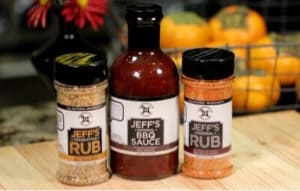[h3]From the producer's website[/h3][h3] [/h3][h3]What's the difference between Cured and Uncured Meats? [/h3]
Cured products contain sodium nitrite and/or sodium nitrate, which are used to cure and preserve meat. Nitrates occur naturally in many foods; in fact, you might be surprised to discover that nitrates occur naturally in all plants. The amount of nitrates and nitrites you ingest when eating cured products is negligible and does not pose any health risk. Some consumers prefer cured meats, while others prefer to avoid added sodium nitrate and sodium nitrite, so Niman Ranch offers both alternatives in our product line. The idea to cure meat began with a need to keep meat from spoiling. Salt, and saltpeter, the natural form of potassium nitrate, have been used as preservatives for centuries. During modern times, pink salt has become the preferred medium for curing and preserving meats, because it contains a standardized amount of sodium nitrite and is easy to control in processing. Use of nitrites and nitrates in the production of cured meats is now carefully regulated, with concentration not to exceed 200 parts per million in finished products. Their use is invaluable in inhibiting growth of microorganisms such as botulism. Additionally, nitrates and nitrites help meat to retain its pink color and add depth and complexity of flavor, contributing characteristic aroma and flavor notes that make bacon, ham and other cured meats taste so good. In the United States, meat products are regulated by the United States Department of Agriculture. The USDA defines uncured to indicate products that have not been preserved by adding sodium nitrite, sodium nitrate or a salt cure. So when you see uncured on the label, the label is informing you that the product does not contain added sodium nitrate or sodium nitrite. Despite USDA regulations, it's probably more accurate to say that uncured products are naturally cured. Instead of adding nitrate or nitrite chemicals, we use celery juice, a source of naturally occurring nitrates. During processing, the nitrates in celery juice are consumed by lacto bacteria--anaerobic organisms similar to the friendly bacteria in yogurt--that like a salty environment. Over time during the natural curing process, the nitrate in celery juice is consumed by the lacto bacteria and converted first to nitrite, then to nitrous oxide, a gas that dissipates into the atmosphere. The amount of natural nitrates remaining in the finished product depends on whether and when the meat is cooked, as cooking halts the dissipation process. Like cured products, natural curing inhibits bacteria, helps prevent meat from going off-color, and deepens flavor. Whether you choose cured or uncured Niman Ranch products, you can be sure you are receiving the best in quality.
Cured products contain sodium nitrite and/or sodium nitrate, which are used to cure and preserve meat. Nitrates occur naturally in many foods; in fact, you might be surprised to discover that nitrates occur naturally in all plants. The amount of nitrates and nitrites you ingest when eating cured products is negligible and does not pose any health risk. Some consumers prefer cured meats, while others prefer to avoid added sodium nitrate and sodium nitrite, so Niman Ranch offers both alternatives in our product line. The idea to cure meat began with a need to keep meat from spoiling. Salt, and saltpeter, the natural form of potassium nitrate, have been used as preservatives for centuries. During modern times, pink salt has become the preferred medium for curing and preserving meats, because it contains a standardized amount of sodium nitrite and is easy to control in processing. Use of nitrites and nitrates in the production of cured meats is now carefully regulated, with concentration not to exceed 200 parts per million in finished products. Their use is invaluable in inhibiting growth of microorganisms such as botulism. Additionally, nitrates and nitrites help meat to retain its pink color and add depth and complexity of flavor, contributing characteristic aroma and flavor notes that make bacon, ham and other cured meats taste so good. In the United States, meat products are regulated by the United States Department of Agriculture. The USDA defines uncured to indicate products that have not been preserved by adding sodium nitrite, sodium nitrate or a salt cure. So when you see uncured on the label, the label is informing you that the product does not contain added sodium nitrate or sodium nitrite. Despite USDA regulations, it's probably more accurate to say that uncured products are naturally cured. Instead of adding nitrate or nitrite chemicals, we use celery juice, a source of naturally occurring nitrates. During processing, the nitrates in celery juice are consumed by lacto bacteria--anaerobic organisms similar to the friendly bacteria in yogurt--that like a salty environment. Over time during the natural curing process, the nitrate in celery juice is consumed by the lacto bacteria and converted first to nitrite, then to nitrous oxide, a gas that dissipates into the atmosphere. The amount of natural nitrates remaining in the finished product depends on whether and when the meat is cooked, as cooking halts the dissipation process. Like cured products, natural curing inhibits bacteria, helps prevent meat from going off-color, and deepens flavor. Whether you choose cured or uncured Niman Ranch products, you can be sure you are receiving the best in quality.








